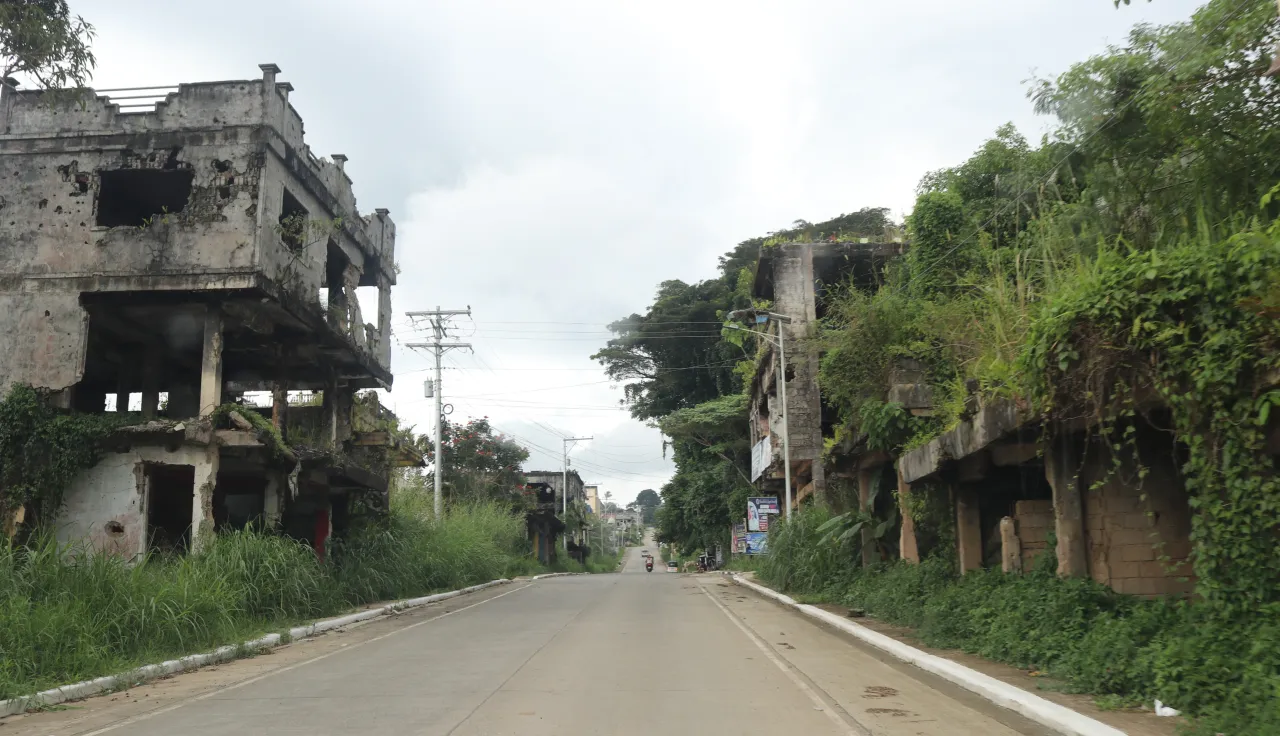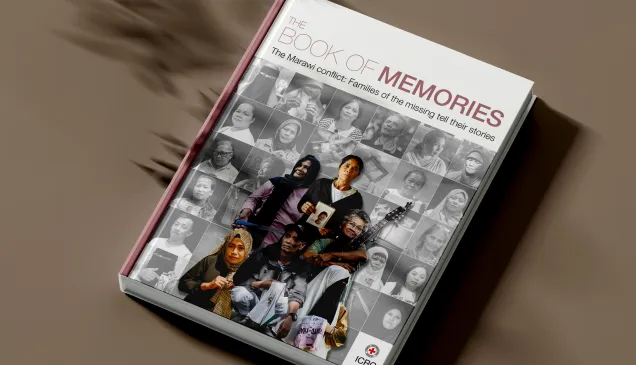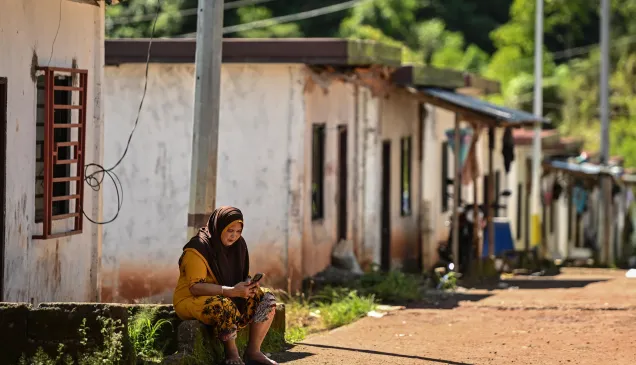Philippines: Memories of Marawi

Families of people who went missing during the 2017 armed conflict in Marawi City, Lanao del Sur, in Mindanao, are still reeling from the pain of losing contact with their loved ones. They have had to deal with feelings of ambiguous loss or sadness that they feel over the uncertainty and lack of information about their missing loved ones. Many of them have struggled financially, as their missing relatives were almost often the family breadwinners.
Despite the challenges they face, families of missing people have found solace and strength in each other. The International Committee of the Red Cross (ICRC), a neutral and impartial humanitarian organization seeking to protect people affected by armed conflicts and provide them with assistance, has been supporting families of missing people linked to the Marawi conflict since 2017. From then until 2023, the ICRC has supported over 250 families who have yet to clarify the fate and whereabouts of their missing kin.
One of the ways in which the ICRC has supported them is through the accompaniment program, a multidisciplinary program that aims to address the multifaceted consequences resulting from the absence of a loved one through peer-support groups, information sessions and individual support. The program has a mental health and psychosocial support component which offers emotional support to the families who have to deal with the lack of information surrounding their missing loved ones. During the peer support sessions, the families learn to identify positive coping mechanisms and, if possible, acquire skills to provide basic psychological care. From 2017 to 2024, almost 410 individuals have benefitted from the accompaniment program.
Here are the stories of two women whose lives were changed after joining the program.
Sarah*

Sarah at home. Beside her are pants that her missing brother left behind. Photo: L. Arada/ICRC
Before joining the ICRC’s accompaniment program, she admitted that she felt hopeless.
“I graduated with a bachelor’s degree in nursing but I couldn’t continue living my life. I just wanted to stay at home. I even deactivated my social media accounts and changed my phone number. Life became dark. I just wanted to be alone and cry all the time. I kept asking why I had to lose my brother. But I couldn’t tell anyone about what I was going through because no one could understand my experience.”
Sarah also lost her belongings during the conflict—her jewelry, clothes, and even her house.
“Sometimes I would see a house like the one I had, and it would crush my heart. ‘That looks like the house I built with the money that I earned from working in Saudi Arabia, the one that was burnt to the ground,’” she said.
The conflict also caused the displacement of her relatives.
“They now live in different areas in the Philippines—this has been painful for me. We can’t have family reunions anymore because not everyone can come. Not everyone has enough money to travel for our reunions. Whatever we earn from our businesses is enough to buy food and support our families.”
Despite everything she has been through, she is grateful for joining the ICRC’s accompaniment program. In the program, relatives of the missing share their favourite memories of their loved ones through poems, art and crafts, songs or by cooking their favourite food. Accompaniers like Sarah also guide families to available services to resolve administrative and economic issues resulting from the absence of their loved ones.
She explained that the program provided ways in which families could cope with their loved ones’ absence: “Through the program, families of missing persons will understand that your life should not focus only on the negative events that have happened in the past. You also need to look for the light. That’s what we teach. When you remember your missing loved one, you should also remember your positive memories together. You cannot focus on just the negative. Everything should be acknowledged in life. Self-care, coping, and having the right values in life—these are some of the lessons taught in the program.”
The program also helped families of the missing to understand that they have relationships that they have to nurture with other people.
“For example, she’s a mother who lost her husband. Despite what happened, she is still a friend to her friends. She’s still a neighbor to people living in her village. But sometimes we FOMs forget that. The program helps families of missing persons to remember their other roles: their purpose in the community, and the household.”
Sarah credits the program for helping her find her motivation.
“If in the past, you were like a dead leaf, the accompaniment program will turn you into a tree that will bear fruit. For example, I was a nursing graduate but I did not immediately pursue my career. I found my motivation to review for the board exams because of the program. That’s how the program helped me,” she said.
Through the program, Sarah found a new group of friends who understood what she had gone through.
“When you lose a loved one, you will feel alone. It’s really painful. You will feel powerless. But when you have a support network, there’s a group of people who have the same thoughts and feelings as you do. You will feel that they are on your side. Some people were strangers to me before I became an accompanier, but because of the program we became like sisters. We tell each other our problems,” she said.
Sarah has slowly rebuilt her life over the past few years. She has gotten married and is expecting the birth of her first child. She has also passed the nursing board exams. She is grateful for a lot of blessings, but she is still missing her brother every day.
For many years, the ICRC has been urging the Philippine government to provide clarity on the fate of those who have gone missing in connection to the Marawi conflict. But as families of the missing can attest, much more needs to be done. Sarah, and other families of the missing, are looking forward to the day that they will know the fate and whereabouts of their missing loved ones.
Aminah*

Aminah looks at photos of her father and husband, both of whom went missing during the Marawi conflict. Photo: B. Sultan/ICRC.
War causes invisible wounds to survivors, civilians and combatants alike. From depression to post-traumatic stress disorder, civilians suffer from the effects of armed conflicts, wounds that they will carry for many years to come.
It’s been seven years since Aminah, a 34-year-old accompanier and entrepreneur, has last seen her father and her husband who both went missing during the Marawi conflict. Aminah is still carrying the invisible wounds that their absence has caused.
Her husband and her father supported their family by working as fishermen. They were enjoying a simple but happy life in the small town of Marantao, about four kilometers from Marawi.
“My husband was a very kind person. My father adored him. When my husband went missing, my father could not accept that he could be dead. We were so sad that even during Ramadhan, we were all crying while eating. Two months after my husband’s disappearance, someone said they saw my husband in Marawi. My father went to Marawi to look for my husband. But just like my husband, my father never came back,” Aminah tearfully shared.
Devastated by the disappearance of her father and husband, Aminah, her mother and sister isolated themselves. They refused to leave their house.
“My mother didn’t want to sleep. She was waiting for my father. She wanted to be awake when my father came home. She couldn’t eat; she lost so much weight,” Aminah recalled.
“I have not been able to sleep well since the day my husband left. Then my father also disappeared. I didn’t want to go out anymore. I didn’t want to see anyone laughing because I was worried that they were laughing at me. I lost two of my most beloved people. I lost hope. It was very painful,” she said.
Aminah’s life changed in 2020 when she met ICRC staff who told her about the accompaniment program. She was asked if she would be willing to undergo training to become an accompanier. She also learned that under the program, the ICRC could give grants to families of missing persons to help them start their businesses or allow them to continue with existing ones.
“In our first meeting, I talked to strangers about everything that I felt. All of my pent-up emotions. I told them about all the pain that I had kept in my heart for years. I felt a huge relief. It was a very good feeling to be heard,” Aminah revealed.
Aminah was trained with other families and learned how to cope with her feelings. Being an accompanier has helped her in her journey of healing. The program gave her a safe space to talk about her painful experiences.
“The other families could feel what I’m feeling. They are fighting for survival, too. I am not alone. I learned from their experiences,” Aminah said.
Her work as an accompanier allows her to help families of missing who are going through the same problems she had.
“During the first session of my group, the atmosphere was dark and heavy. Everyone was carrying their baggage and they were hesitant to unload in front of strangers. It was hard for them to speak up. But that’s where I, as an accompanier, stepped in. I was there to help them help with their burdens,” Aminah said.
Being an accompanier also changed her personality. She’s become more outgoing. She’s stopped isolating herself and has even traveled with her children.
“I used to be a shy and quiet person. In the past, I didn’t like sharing my thoughts and feelings with anyone. But ever since I became an accompanier, I have become friendlier and more helpful. I am now more comfortable opening up to people. I feel free,” Aminah shared.
Even her mother and sister have been changed by the program.
“I saw the changes in them each time they attended a session. My mother, who used to be hopeless, slowly started to leave the cage that she built around herself. She also started small businesses with the help of ICRC,” she added.
Despite the progress that she has made, she still misses her husband and her father.
“Until now we cannot find them. They haven’t come home. The pain of missing someone is unimaginable. But I told myself, I am here for a purpose. I have to continue my life no matter what,” she said.
Sometimes, Aminah meets people who do not fully empathize with the families of missing people. She is urging them to respect the families who have lost their loved ones in Marawi.
“They do not know the sufferings that we have had to endure. The pain will always be here in our hearts. Even if the wound heals, our scar will always be here,” she added.
As Sarah and Aminah try to find some normalcy in their lives, the ICRC is urging the authorities to provide clarity on the fate and whereabouts of people who have gone missing due to the conflict in Marawi. Seven years have passed, and the families have the right to receive answers.
Under IHL, the authorities have an obligation to prevent disappearances and account for those who do go missing during an armed conflict. Providing clarity on the missing’s fate and whereabouts is enshrined in the Geneva Conventions, which the Philippines is a party to. It is high time for the families to know what has happened to their loved ones, for them to heal.
*Names have been changed to protect the subjects’ privacy.



